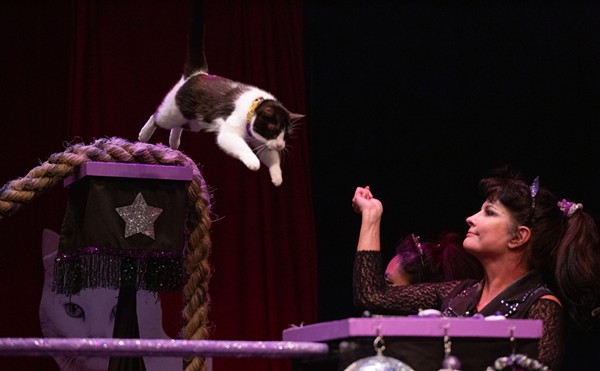South Texas veterans have a new site to visit on August 14, the day that ended the War in the Pacific in 1945, bringing World War II to a close: a Texas Historical Commission Marker in Three Rivers commemorating the Rice Funeral Home as the site of the Felix Longoria incident.
In late 1944, Three Rivers’ resident Felix Longoria was drafted into the U.S. Army. “Soon thereafter,” writes Dr. Patrick Carroll, professor of history at Texas A & M Corpus Christi and author of Felix Longoria’s Wake, “he left his family and reported for active duty. After six weeks of basic training, Felix boarded a ship that brought him to Luzon for his first combat assignment as an infantryman. Soon afterwards, he volunteered to join a patrol with orders to dislodge enemy snipers.” Army Private Longoria, killed by an enemy sniper, was posthumously awarded a Bronze Service Star, a Purple Heart, a Good Conduct Medal, and a Combat Infantryman’s Badge.
In late 1948, Longoria’s remains were returned to the U.S., and his wife, Beatrice Moreno de Longoria, called the Manon Rice Funeral Home in Three Rivers to arrange a funeral service. According to interviews and notarized statements, undertaker Tom Kennedy told her the wake could not be held there because “the whites would not like it.” At the urging of her sister, Sara, Moreno de Longoria discussed the incident with American G.I. Forum founder Dr. Héctor P. García. García’s efforts to resolve the matter drew national attention to what became known as the Felix Longoria Affair, and made the young G.I. Forum a major civil-rights player.
Then-Senator Lyndon B. Johnson offered his assistance and support, and on February 16, 1949, Longoria was buried with full military honors in Arlington National Cemetery in Washington, D.C.
Santiago Hernandez, civil-rights chairperson of the American G.I. Forum, first began researching the Felix Longoria incident more than a decade ago. He urged U.S. Congressman Lloyd Doggett to file a bill renaming the Three Rivers post office after Longoria. Doggett supported the measure, and in 2004 the Three Rivers City Council decided not to oppose the move at a tense, standing-room-only meeting. The bill, however, died and was not revived. Shortly thereafter, Hernandez submitted an application for historic designation of the Rice Funeral Home to the Texas Historical Commission.
“My goal was to help our youth learn and study our role models. A lot of our history is silent,” Hernandez said. “Also, it was a travesty that some people said `the Longoria incident` was a myth.”
Due to the national publicity the incident received, in 1949 the Texas House of Representatives passed House Simple Resolution 68 appointing a Special Investigation Committee on the Reburial of Felix Longoria. The papers, maintained by the Texas State Archives and Library Commission, consist of Johnson’s correspondence and the committees’ majority and minority reports. The archives’ abstract records the political division: “The committee filed two reports; the majority report concluded that no discrimination had taken place, while the minority report signed by Rep. Oltorf held that the funeral director’s words and actions were discriminatory.”
The committee was charged with interviewing individuals involved as well as reviewing notarized statements, such as those by Gladys Blucher, whom Dr. García had asked to serve as an ear-witness while he conversed with Kennedy in 1949, and George Groh, a reporter for the Corpus Christi Caller, who wrote that Kennedy had stated, “We never made a practice of letting Mexicans use the chapel and we don’t want to start now.” The whereabouts of the committee’s records, which reportedly contained 372 pages in three volumes, are unknown.
On April 17, 2010, after several years of fundraising, the new historical marker was unveiled at the Rice Funeral Home. Many town residents attended as did Adela Cerra, daughter of Felix Longoria, who was only 4 at the time of his death; Sara Posas, the late Beatrice Longoria’s sister; Wanda Garcia, daughter of the late Héctor García; and Three Rivers Mayor James Liska. The ceremony did spark some controversy, notably on the Three Rivers Wire website, where one commenter wrote that the marker would cause Three Rivers residents to “continue to suffer.”
According to Hernandez, a few Live Oak County residents wrote letters to the THC urging it to reject the historical-marker application. The THC allows 120 days for an appeal, and the commission scheduled a meeting with the opposition three times, but Hernandez said they never showed.
That the Felix Longoria Affair sparked a public debate is undeniable. “Ultimately, this local and private event affected the national conversation on civil rights, politics and patriotism,” reads the closing line of the historical marker, which also refers to the “separate but equal” laws that may have informed Kennedy’s worldview. World War II caused the nation to reexamine those laws. The Texas Legislature’s 1943 “Caucasian Race Resolution” granting Latin Americans status as “white” citizens notwithstanding, thousands of Latino-American veterans returned from the war to find they were still second-class citizens at home.
“The community is still divided. Many feel it never happened, that it was made up or exaggerated. Others feel it was so minimal it doesn’t warrant comment,” said John J. Valadez, director of the upcoming PBS documentary The Battle After the War, which is scheduled for broadcast this fall. “The incident sent shock waves for 16 years and influenced civil-rights legislation. Most people don’t realize Mexican-American World War II veterans were critical in shaping civil-rights history when they struggled to access their G.I. Bill.”
Posas, who first encouraged her sister to contact Dr. Flores, said the opening prayer at the April ceremony. “I was happy to see so many people from the surrounding areas,” she said. “The story must be told because there have been so many changes since that incident. It changed many lives.” •















